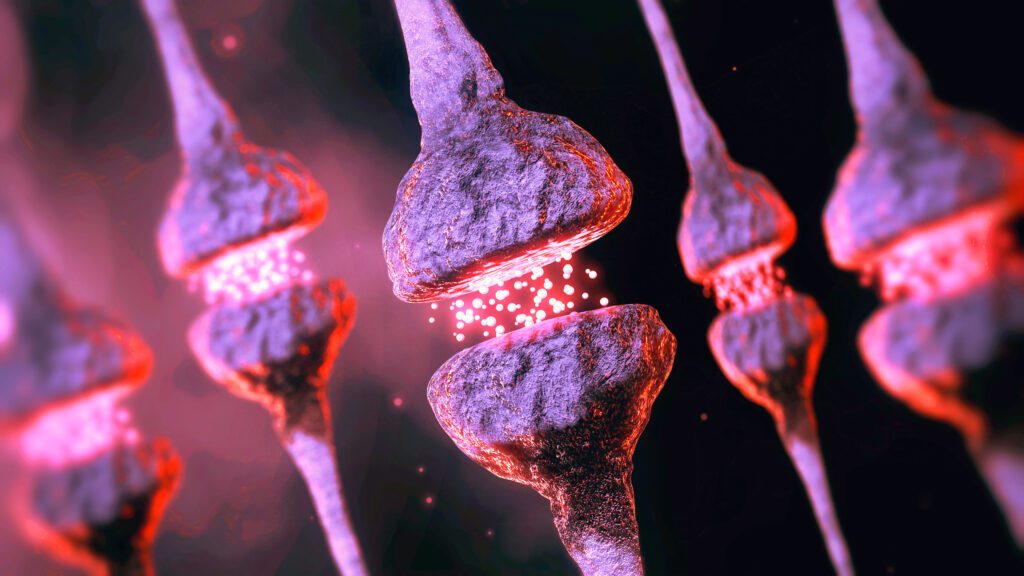From Mood to Memory, This Chemical Is a Mighty Messenger
If you were told that there is a chemical in your body that plays a role in nearly every part of your life, would you believe it? It’s serotonin, and while you may have heard of it in relation to feeling happy, it actually plays a role in nearly every function of our bodies; it even plays a role in blood clotting, a function that was discovered in 1948. Scientists don’t know the exact role that serotonin plays in every function, but they do know that it’s vastly important to our physical and mental health. Take our quiz to learn what scientists do know about serotonin.
1. Which of the following are areas where serotonin is made and used in our bodies?
A. Serotonin is used as a neurotransmitter in the brain to send chemical messages from neuron to neuron.
B. Serotonin acts as a hormone in your gut, sending messages to cells throughout your gastrointestinal tract.
C. Serotonin in your blood constricts your blood vessels to slow bleeding and allow the blood to clot.
D. All of the above
2. What are other functions that scientists know serotonin plays a role in, though the exact nature of the role is unclear?
A. It regulates your sleep cycles and the body’s bone density.
B. It influences appetite, bowel movements, and the ability to feel nausea.
C. It affects sexual activity and libido.
D. Serotonin influences learning, memory, and executive function.
E. All of the above
3. Which of the following is NOT a way that serotonin affects your mental health?
A. It affects your ability to control and regulate your mood.
B. Low serotonin levels play a role in depression and irritability.
C. It causes schizophrenia.
D. Low serotonin levels play a role in mental decline.
4. True or false? Drugs targeting serotonin and serotonin receptors in some way are either in use or being tested for use to treat virtually every mental disorder.
5. Which of the following are common medications or supplements that target serotonin, usually through increasing the amount of serotonin in your body?
A. Selective serotonin reuptake inhibitors (SSRIs) work to ensure the serotonin you have is available in your brain for longer.
B. Serotonin and norepinephrine reuptake inhibitors (SNRIs) block or delay the reabsorption of both serotonin and norepinephrine.
C. Supplements like St. John’s wort, SAMe, and tryptophan.
D. All of the above
6. True or false? Having too much serotonin, such as through mixing medications and supplements or taking more than the prescribed dosage of your medication, can put you at risk of a serious condition called serotonin syndrome.
7. Which of the following are symptoms of serotonin syndrome?
A. Tremors, muscle twitches or spasms, muscle stiffness, and/or increased reflexes (hyperreflexia).
B. Sweating and/or flushed skin.
C. Nausea, vomiting, and/or high fever.
D. Restlessness and/or anxiety.
E. Headache, dilated pupils, and/or disorientation.
F. Rapid heart rate, irregular heartbeat, and/or high blood pressure.
G. All of the above
8. Which of the following are natural ways to increase your serotonin levels?
A. Exercise for at least 20 minutes every day.
B. Spend time in direct sunlight.
C. Meditate for 20 minutes a day.
D. Eat more complex carbs, like vegetables, fruits, legumes, and whole grains, as they contain tryptophan, which your body uses to make serotonin.
E. All of the above
9. True or false? Foods like turkey are high in tryptophan, but the high protein keeps a lot of the tryptophan from getting to your brain.
10. What should you do if you fear your serotonin levels are a problem, either from having too low or too high a level?
A. Discuss your symptoms with your doctor; see your doctor immediately if your depression or anxiety worsens.
B. Take your medication as prescribed.
C. Monitor your moods and thoughts.
D. Taper off your medication gradually if you want to stop taking it.
E. All of the above
compiled by ERIKA ALDRICH / Information from Mental Health America and Healthline
ANSWERS:
- D. All of the above
- E. All of the above
- C. Serotonin does not cause schizophrenia.
- True
- D. All of the above
- True
- G. All of the above
- E. All of the above
- True
- E. All of the above
